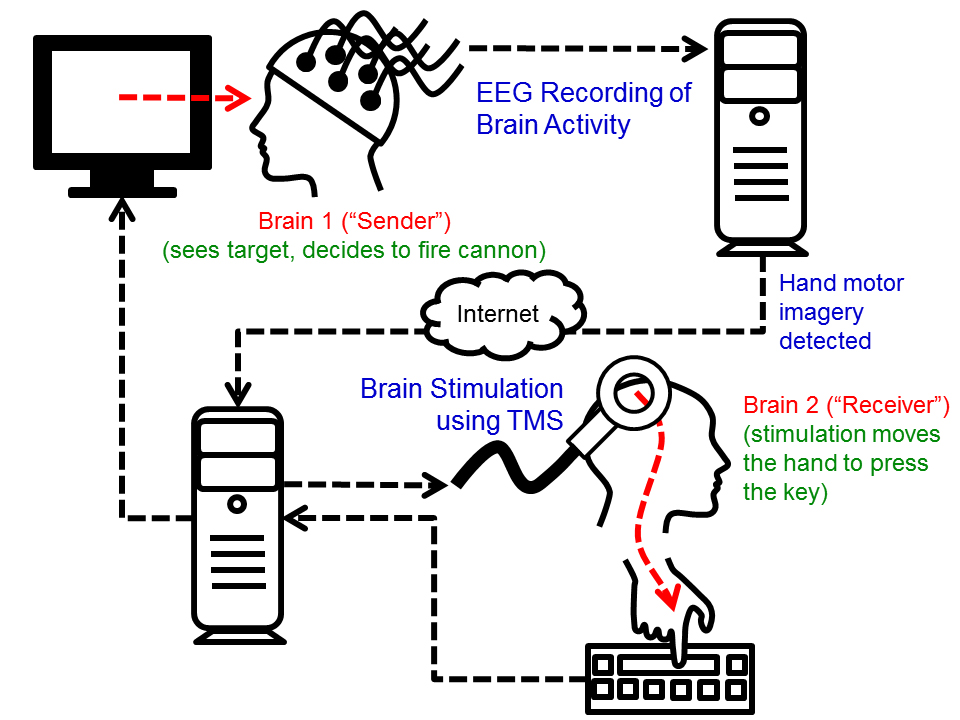WATCH: We are closer than ever to a human mindmeld
Scientists have found a way for one human brain to control another over the internet. Really.


A free daily email with the biggest news stories of the day – and the best features from TheWeek.com
You are now subscribed
Your newsletter sign-up was successful
It sounds a little like something from science fiction, but University of Washington researchers announced Tuesday that they've created a way for one person to control another person's actions using only their brain, an internet connection, and some mind-reading hardware.
Andrea Stocco, a research assistant and psychology professor who participated in this thought control, jokingly referred to the experiment as a "Vulcan mindmeld." But more precisely, says Sharon Begley at Reuters, "the feat is less a conceptual advance than another step in the years-long progress that researchers have made toward brain-computer interfaces."
Previously, scientists have linked up the brains of two rats on different continents, had a monkey at Duke University control a mechanical arm in Japan with just his thoughts, and even let a human brain swish the tail of a sleeping rat using only thought power. But having one human control another human's actions through mind control is another level of fascinating — and spooky.
The Week
Escape your echo chamber. Get the facts behind the news, plus analysis from multiple perspectives.

Sign up for The Week's Free Newsletters
From our morning news briefing to a weekly Good News Newsletter, get the best of The Week delivered directly to your inbox.
From our morning news briefing to a weekly Good News Newsletter, get the best of The Week delivered directly to your inbox.
Here's how the experiment worked: Rajesh Rao, a professor of computer science and engineering, sat in a room at one end of the Seattle campus, wearing an electroencephalography (EEG) cap — electrode-heavy headwear that measures brain activity. Across campus, Stocco sat in his lab wearing a purple shower cap with transcranial magnetic stimulation coil — which activates sections of the brain — positioned over his right-hand-controlling left motor cortex.

On his end, Rao played a simple cannon-shooting computer game with his mind, imagining he was firing the shot at the right moment without actually moving his hand. That impulse was transmitted across the internet to Stocco, who was facing away from the computer screen with earplugs blocking out all noise. When Rao mentally tapped his finger on the trigger, Stocco involuntarily moved his, firing the shot from a keyboard.
"Stocco compared the feeling of his hand moving involuntarily to that of a nervous tic," say Doree Armstrong and Michelle Ma at the University of Washington press office.
Not everybody is impressed with the experiment. Miguel Nicolelis, who conducted the rat-brain research at Duke, tells NBC that "this is not a breakthrough brain interface, because the second subject has no choice." Stocco received no message, only an electrical signal that could have been delivered by a computer, he points out. "I'm afraid that people will take this and think that we are one step from mind control, and this is not even close."
A free daily email with the biggest news stories of the day – and the best features from TheWeek.com
Nicolelis and other researchers also note that the experiment hasn't been written up in a peer-reviewed journal yet. The university acknowledges the aberration of going public without publishing first, but points to a video of the experiment as proof enough to stake their claim to the first human-to-human brain interface:

Observers with no skin in the game are more impressed. "A lot of research papers find their way onto my desk and off it," says Sarah Wild at South Africa's Mail & Guardian. Some are cool, others "obvious or arcane," but this is one of those reports that "makes you wonder whether you are in a sci-fi novel and sets the 'warning' alarms sounding." If repeatable, she says, this human mindmeld is "creepy, yet awesome."
Rao and associates say the research could one day be used to help immobile patients communicate or even help passengers land aircraft when the pilot is incapacitated. But "the problem with reading sci-fi and fantasy is that you're better informed about all the things that could go wrong," Wild says.
The otherworldly, sci-fi aspect struck a chord with other journalists as well. "The world of mind-control zombie armies may have gotten just a little closer," says Alan Boyle at NBC News. "Shades of Darth Vader and demonic possession?" asks Dan Vergano at USA Today. Reuters notes that, like much brain-communication research, this was partially funded by the U.S. military. "The biggest question on our minds is how long until the U.S Army weaponizes it?" says Steven Bogos at The Escapist.
There's probably no cause for concern yet. Here's Robert Sorokanich at Gizmodo: "Your visions of this being used for nefarious plots are probably highly overblown." First of all, he says, "as sci-fi bizarro as this sounds, the whole setup basically used off-the-shelf components." And the researchers assure us that it can't make somebody act against their will, or be used covertly, "what with all the apparatus they'd have to wear."
Rao and Stocco will continue working on the project, though, with the goal of allowing people to share messages, not just transmit simple movement commands. "That's when we'll really be getting into Matrix-style stuff," says Gizmodo's Sorokanich. "At least now you've got plenty of time to decide if you want the red or blue pill."
Peter has worked as a news and culture writer and editor at The Week since the site's launch in 2008. He covers politics, world affairs, religion and cultural currents. His journalism career began as a copy editor at a financial newswire and has included editorial positions at The New York Times Magazine, Facts on File, and Oregon State University.
-
 Political cartoons for February 21
Political cartoons for February 21Cartoons Saturday’s political cartoons include consequences, secrets, and more
-
 Crisis in Cuba: a ‘golden opportunity’ for Washington?
Crisis in Cuba: a ‘golden opportunity’ for Washington?Talking Point The Trump administration is applying the pressure, and with Latin America swinging to the right, Havana is becoming more ‘politically isolated’
-
 5 thoroughly redacted cartoons about Pam Bondi protecting predators
5 thoroughly redacted cartoons about Pam Bondi protecting predatorsCartoons Artists take on the real victim, types of protection, and more
